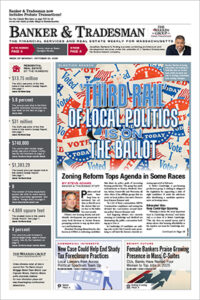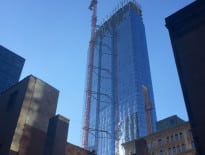With winnings piling up fast, no one wants to be told the party might soon be ending, whether it’s a friendly game of poker or the high-stakes business of selling office towers and skyscrapers.
So maybe it’s not surprising Boston’s hotshot investment brokers, who are selling buildings and towers for some really crazier numbers lately, saw no immediate end to bubble-like appreciation of prices when I made the rounds the other day.
And for that matter, who is to say they aren’t right? After all, it’s far easier to call a bubble than to predict when it’s going to burst, though burst it will, as is the case with these madhouse tower prices.
Still, executives at Boston Properties are offering a more sober take on the market, suggesting “pricing levels may be tested this fall.”
OK, it’s not exactly a sky is falling prediction, but it got my attention amid all the excitement over tower prices gone wild.
“There is … a significant pipeline of real estate currently in the market and pricing levels may be tested this fall given the supply of product,” Boston Properties CEO Owen Thomas told market analysts on a recent earnings call.
Along with lots of towers for sale, Thomas also pointed to “higher volatility” in the stock market and the “prospect of an interest rate hike before year-end.”
All that said, Owen stressed he sees no signs of weakening at the moment and no backing off by all the deep-pocketed international investors, who have helped drive up prices.
Still, actions speak at least as loudly as words, and Boston Properties right now is selling assets, not buying, while pumping the profits into new office and mixed-use developments around the country.
Basically, office tower prices have gotten so high that it’s more profitable to build a new suburban office complex or downtown high-rise, and then cash in on rising commercial rents, than it is to buy someone else’s overpriced trophy.
“We continue to evaluate new acquisitions, but are finding pricing challenging and uncompetitive from a financial return perspective with our development opportunities,” Owen told analysts.
Owen later went on to elaborate on why he’s hedging his bets when it comes to what has been a long-running bull market in office tower prices.
He pointed again to the tumult in the capital markets and what appears to be Fed rate hike just in time for Christmas, before returning to the phenomenon of all those towers for sale at sky-high prices.
“Lastly, and anecdotally, a lot of what we see and what we hear from the industry is there’s a significant pipeline of assets for sale, both office assets and other asset classes currently in the market,” Owen said. “So I just make the point, again we have no specific deal evidence of change, but there are a few of these moving currents which could have some impact on it, and we will have to see.”
Fast Buys, Faster Sales
But while Boston Properties may be sounding a note of caution, others are clearly marching to the beat of their own drummer, who, in some cases, appear increasingly tipsy, if not downright drunk.
Oxford Properties out of Canada and JPMorgan Chase in August agreed to shell out a hefty $1.3 billion for a nice but not exactly stunning Back Bay office complex at 500 Boylston and 222 Berkeley streets.
That deal, set to close by year end, shattered the once unthinkable $1,000 a square foot range.
“We are seeing some pretty spectacular prices per square foot,” said Scott Dragos, senior vice president at Colliers International, who’s in the optimist camp. “It’s about as competitive as we have ever seen it downtown.”
In fact, prices are rising so fast that we are even starting to see a high-end version of the house flipping that marked the real estate bubble of the mid-2000s. Some investors are putting their downtown office towers on the market just two or three years after shelling out rather healthy sums for them.
The latest to test the resale market is 99 Summer St., which just changed hands a couple years ago. And why not? The owners of 2 Liberty recently pocketed $417 a square foot for that middle-market, Class B building after buying it for $270 a square foot in December 2012.
The owners of 230 Congress St. did even better, selling for $500 a square foot in September after buying for $330 a square foot two years before.
Frank Petz, team leader for JLL’s New England capital markets team, is another who still sees upside potential in the current market, $1,000 a square foot prices or no.
As Petz sees it, one of the biggest problems right now is simply running out of towers to sell, with only a relative handful of blockbuster properties out there. After all, we are talking about huge towers and office buildings, not used cars or condos.
“We have had a great run,” he said, adding “we have to be careful we haven’t burned through the woodpile.”
Rents in the city’s top Class A towers still have room to grow, with another 10 percent or more before they reach their peak, he believes.
“We will have room to run,” Petz said.
He may be right. Then again, it may be all just wishful thinking.
As Owen, Boston Properties chief executive, put it the other day in his chat with market analysts, “We will have to see.”
Stay tuned. Sooner or later, it is going to get quite interesting.









